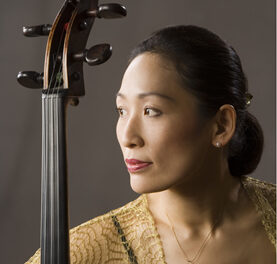Over decades of concert going one encounters some artists who, in addition to technical facility, have engaging personalities and original ideas about programming. Instead of offering a couple of routine classical pieces plus a romantic one or even an academic “root canal,” they think creatively, outside the box. Violinist Sarah Johnson is such an artist, and on many occasions her willing co-conspirator has been Duke University pianist Jane Hawkins. In the past, they have given programs built around women composers such as Amy (Mrs. H.H.A.) Beach or overviews of the works of single composers such as Moravian Charles Vardell. I thought of all this as, on the sunny afternoon of November 2, I drove the back roads toward the Weymouth Center in Southern Pines.
Both artists were in whimsical moods and top form. The intimate Georgian music room (which was, originally, either a large dinning room or a small ballroom) has less than half the capacity of the beloved Ernest Nelson Music Room on Duke’s East Campus, so it conveys the feeling of being almost elbow-to-elbow with the artists. It is fine for string quartets, but it takes great care to keep a piano reigned in so as not to swamp a recital partner. With the lid at its lowest position, Hawkins held her piano close to the bit. Despite many high exposed notes, Johnson’s intonation passed the aural magnifying glass.
Sunday’s program was loosely organized under the title “Fiddler’s Galaxy,” after a work by Kenneth Frazelle, a composer who, like Johnson, is based at the North Carolina School of the Arts. With the exception of Beethoven’s pastoral Fifth Sonata in F, Op. 23 (“Spring”), the program consisted of American works, many of which bore the imprint of folk music. The deceptively warm afternoon made the out-of-season aspect of the Beethoven less jarring. The relaxed dialog between the violin and the piano was most winning, and the flowing musical lines of the slow movement were highlights.
Lush Romantic music was represented by Morgen-Gesang , Op. 9, by Arthur Foote, and by a Romance by Amy Beach. Both composers were associated with the so-called “Second New England School,” which encompassed Paine, Chadwick and Parker. In this music, which suggests American equivalents of similar pieces by Kreisler or Rachmaninoff, one may wallow in plush melodies.
Two surprisingly painless selections by Lukas Foss were played. These tonal works-“Early Song” and “Composer’s Holiday,” the first and third movements, respectively, from Three American Pieces -were, the composer wrote, created “at a time when I was in love with my newly adopted country.” (He also noted that “My American period continued until I became wildly avant-garde.”) “Early Song” begins slowly, “with a hint of a prairie lullaby,” followed by a breathless, faster section. “Composer’s Holiday” opens with a driving rhythm in the piano, quickly joined by the animated violin playing hints of several tunes and lively pizzicatos. A “hidden tune” in it went unidentified on this occasion.
Frazelle’s Fiddler’s Galaxy was commissioned for the Spoleto Festival USA. It takes its name from the Appalachian town of Galax, Virginia, where the oldest fiddler’s convention in the country is held. The composer has spent a great deal of time in the area and has used borrowed bowings, phrasings, and particular versions of tunes from the region in this work. The first section, “Old Time Conventions,” was omitted; only the second, aptly named “Breakdowns,” which includes the traditional tune “Old Time Sally Anne,” was performed. Johnson filled this number with idiomatic playing quite unlike her readings of Beethoven, Foote or Beach.
Closely related in geographic and musical sources was the last work, “Cloggin’,” from Robert Ward’s Appalachian Dances and Ditties . A recent performance of a cello version of this work on the N.C. Museum of Art’s “Sights and Sounds on Sundays” series, reviewed in these pages, was introduced by the composer. Johnson and Hawkins played the original version. Using sources similar to the Frazelle, Ward “pictures the climax of a Saturday night social when the cloggers become the center of attention [and] the mountain ‘likker’ imbibed earlier has loosened [their] feet.”Johnson effectively conveyed the aural image of a hoe-down.
In remarks about the last Ward, Johnson remembered that she and Hawkins had played the entire piece some years ago at Weymouth and, at the last moment, Dr. and Mrs. Ward came in and sat on the first row. She said it had been unnerving to play it with the composer listening. Afterward, she had asked Ward if he had ever considered writing a work for violin and orchestra. Thus began the connections that led to Johnson’s premiering and recording Ward’s very enjoyable Violin Concerto, still available on Albany TROY126. Two other Albany CDs were on sale at the concert. “American Romantics” (Troy 150) features works by Foote and an essential reading of Beach’s Violin Sonata, played by Johnson and pianist Peter Kairoff. Fiddler’s Galaxy (Troy 407), Johnson’s and Hawkins’ newest release, features many of the recent American works played at Weymouth (Foss, Frazelle and Ward).











